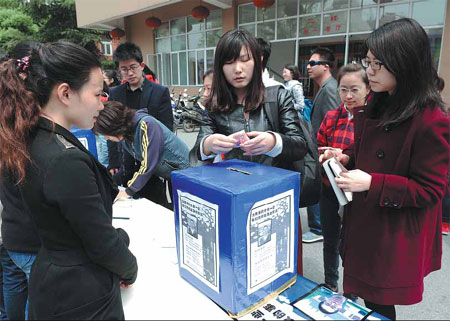Death puts focus on psychological danger
Updated: 2013-05-06 08:10
By He Na and Yang Wanli in Beijing and Wang Hongyi (China Daily)
|
||||||||
|
Students from Shanghai's Fudan University donate money to the parents of Huang Yang, who died from poisoning in April. A roommate has been charged with Huang's murder. Lai Xinlin / for China Daily |
|
The paralyzed Zhu Ling (second right) tries to move with the help of her parents and a housemaid. Zhu was poisoned with thallium 19 years ago when she was studying at Tsinghua University in Beijing. The case has never been solved. Lyu Jiazuo / for China Daily |
Concern increases over students' mental health, report He Na and Yang Wanli in Beijing and Wang Hongyi in Shanghai
Every morning students hurry to classes and laboratories at Fudan University's medical school in Shanghai. As they pass in front of the dormitory, they slow to examine rows of origami cranes hanging on the college grounds.
The thousands of white paper cranes were made by students in memory of Huang Yang, a postgraduate medical student who died from multiple organ failure on April 16, two weeks after drinking water laced with N-nitrosodimethylamine, a highly toxic chemical that is often found in cosmetics and cleansing agents and that causes liver damage.
Huang's roommate, surnamed Lin, has been arrested on suspicion of murder, according to the prosecutor in Shanghai. Police claim the 27-year-old held a grudge against Huang over a trivial matter and deliberately poisoned him by taking the chemical from a university lab and putting it in their dormitory water dispenser.
Lin, from Shantou in Guangdong province, is outstanding academically, but introverted and shy about speaking in public, according to people who know him.
Huang's parents have been devastated by the news. "They cannot believe their son was poisoned, apparently over a trivial matter," said Wang Zhiwei, a classmate at Rongxian High School in Sichuan province who has been staying with Huang's parents.
"His mother is distraught with grief; she can't speak, she just keeps crying. She's heartbroken that her son died in circumstances such as this," said Wang.
Huang was the only child of an underprivileged family. Neither of his parents had a full-time job.
"We are worried how Huang's parents will live the rest of their lives without him," said Wang. Students from Huang's high school and university have started a collection to help the family.
Huang's academic achievements and talent were recognized by teachers and classmates, and there is a consensus that he would have gained a PhD with ease. Sadly, the case has resulted in a new online greeting among former roommates and classmates: "Thank you for your forgiveness and for not killing me during our school days."
The case has shocked the nation and reminded people of a similar event at an elite school 19 years ago.
Zhu Ling, a 21-year-old student at Tsinghua University, was poisoned with thallium, a heavy metal that had been introduced to her cup. Although Zhu survived, she has irreversible brain damage, and is paralyzed and practically blind. Several internal organs are also irreparably damaged, and she requires constant supervision and care. The case has never been solved.
A growing problem
Meanwhile, a number of incidents at other colleges have highlighted the problem of campus violence and the psychological problems that affect some students.
On April 16, a dispute between two students at Nanjing University of Aeronautics and Astronautics over an online game resulted in one fatally stabbing the other.
The following day, a student at Shazhou Professional Institute of Technology in Jiangsu province seriously injured a classmate with a knife. On the same day, a decaying corpse was discovered in a dormitory at Nanchang Hangkong University.
These cases have prompted psychology experts to urge that greater attention is paid to the psychological health of Chinese college students.
"Many people believe that university students live carefree lives, but actually, they are under huge pressure from society and their families. Many look optimistic, but, in fact, they are introverted. This is a common characteristic shared by many suicides," said Lin Guirui, a psychology professor at Capital Normal University and director of the Beijing College Students Psychology Education Research Center.

"The Fudan poisoning tragedy sounds like an individual case, but I think our education system is the soil that breeds such horrible crimes. The ultimate goal of education should be the cultivation of personality, ideals, an outlook on life and values, good human relationships and communication skills. Unfortunately, our education system places too much emphasis on the cultivation of skills that concentrate on the trivial and neglect the essentials," said Lin, who has been researching the psychological health of students for 20 years.
"I've studied many campus suicides and criminal cases. I've come to the conclusion that if a person doesn't have a healthy personality and outlook on life, the skills and certificates they gain are irrelevant. They may cause great harm to those around them. The education authorities and many universities are calling for student counseling to be taken more seriously, but the truth is that little has been done so far. At most universities, the psychological health of students is still being ignored," she said.
This is partly the result of uneven distribution of resources, according to Lin. For example, the education department demands that every university and college has a counseling center for students, but it's not unusual to find universities with more than 10,000 students that only employ one full-time counselor.
"What's worse is that, because of a lack of investment, teachers and the staff of school counseling centers are often poorly paid and have little chance of promotion, so it's hard to guarantee the quality of the counseling on offer," said Lin.
Zhang Jiming, a senior psychologist at the students' counseling center at Beijing Normal University, considered Huang's case to be an isolated incident.
"Fatalities arising from trivial matters usually occur among undergraduates, who are struggling to acclimatize to life without the daily care of their parents and need to learn how to share and forgive. In the postgraduate phase, cases such as this are rare," he said.
Zhang said the case is shocking, but people should be wary of jumping to the conclusion that college students' psychological problems are more serious than those of previous generations.
However, he also admitted the lack of counseling is a weak point in Chinese universities. "Psychological education is a long-term project. When students came for counseling, we discovered that more than 90 percent of them had not received psychological education.
Survival tactics
"In terms of treating problems in social relations, I don't think there are many differences between China and Western countries," said Cynthia Feng, 26, who spent six years studying in the United Kingdom and United States.
"I have heard that many cases of campus violence were caused by psychological problems. For example, a professor refused to allocate good projects to students who disagreed with them, or, sometimes, the professors and students were fighting over the same lover.
"In some cases overseas, campus violence consists of a lone gunman who injures a number of people; few cases of one-on-one revenge have occurred. However, in China, fatalities are often triggered by trivial matters and occur between two people or a small number," said Professor Lin.
"It may be that the problem lies in cultural differences. Westerners are likely to be more upfront about a grievance, while the Chinese usually attempt to avoid confrontation at all costs," said Lin.
She argued that prevention is preferable to cure and suggested a long-term program of student counseling.
Yang Yiyin, a social psychology researcher at the Chinese Academy of Social Sciences, said that when people are in constant close contact, reliance on and comparisons with each other can become magnified. "In relationships such as this, if expectations are unfulfilled, anger or depression may mutate into a desire for revenge or even attacks."
Feng emphasized that campuses in the UK and the US attach great importance to education designed to help students cope with and manage dangerous situations. She joined an emergency drill where the scenario revolved around a shooting incident at a US campus and said all students were encouraged to take part. She also once played the role of the gunman. "It was very impressive when tens of tennis balls were thrown at my face by the student 'victims' when I broke into the classroom," she said, referring to one of the survival tactics promoted by the police.
But the most important thing the students learned was that they must be vigilant in the face of unexpected attacks, because a large number of cases have been triggered by impulsive anger. "It (the training) helps people to remain calm. That means the chances of survival are higher," she added.
Yao Ping, who has lectured at Peking University's department of psychology for nine years, said US students, both at high schools and on campus, have access to optional group discussions about dealing with social relationships and emotional management.
"This not only helps students to express their hidden thoughts, but also creates the opportunity to better understand each other," she said.
New measures
Yao said psychological education that helps students cope with social relationship problems is often not highlighted in Chinese schools.
"But the students have great passion for learning about these things," she said. Her classroom at Peking University seats 220, but the school had to arrange for a larger room last semester to meet the demand from students.
"Most of the younger generation come from one-child families. Some have little experience in dealing with interpersonal conflicts. They are also used to their parents solving problems for them, and I've met many students who spend all their time studying and are less focused on adjusting their mood."
Psychological problems can easily lead to fatal results if not detected early through intervention. Beijing Normal University has established a psychological emergency intervention system for students, and senior psychologist Zhang hopes it will prove beneficial.
"First, all the teachers and even the guards and dormitory keepers monitor the students' behavior and moods. They can report to us or intervene if they discover anything abnormal. Second, each class has a psychological counseling envoy, he said.
"They live and work with their classmates, so it's easy for them to discover problems and offer counseling. If they feel strongly enough, they can refer the students to our counseling center for professional help."
Contact the writers at hena@chinadaily.com.cn, and yangwanli@chinadaily.com.cn
(China Daily 05/06/2013 page6)

 Michelle lays roses at site along Berlin Wall
Michelle lays roses at site along Berlin Wall
 Historic space lecture in Tiangong-1 commences
Historic space lecture in Tiangong-1 commences
 'Sopranos' Star James Gandolfini dead at 51
'Sopranos' Star James Gandolfini dead at 51
 UN: Number of refugees hits 18-year high
UN: Number of refugees hits 18-year high
 Slide: Jet exercises from aircraft carrier
Slide: Jet exercises from aircraft carrier
 Talks establish fishery hotline
Talks establish fishery hotline
 Foreign buyers eye Chinese drones
Foreign buyers eye Chinese drones
 UN chief hails China's peacekeepers
UN chief hails China's peacekeepers
Most Viewed
Editor's Picks

|

|

|

|

|

|
Today's Top News
Shenzhou X astronaut gives lecture today
US told to reassess duties on Chinese paper
Chinese seek greater share of satellite market
Russia rejects Obama's nuke cut proposal
US immigration bill sees Senate breakthrough
Brazilian cities revoke fare hikes
Moody's warns on China's local govt debt
Air quality in major cities drops in May
US Weekly

|

|









